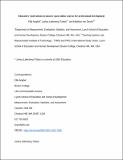| dc.contributor.author | Anghel, Ella | |
| dc.contributor.author | Littenberg-Tobias, Joshua | |
| dc.contributor.author | von Davier, Matthias | |
| dc.date.accessioned | 2025-06-17T16:22:22Z | |
| dc.date.available | 2025-06-17T16:22:22Z | |
| dc.date.issued | 2024-03-18 | |
| dc.identifier.uri | https://hdl.handle.net/1721.1/159429 | |
| dc.description.abstract | Massive Open Online Courses (MOOCs) are increasingly popular for teachers’ professional development (PD). Understanding why teachers take MOOCs and how this relates to course completion could help identify underserved needs in teachers’ professional learning. In the current study, we explored this question, as well as potential gaps between intention to complete the course and actual completion. Using a sample of 3,212 participants in four PD MOOCs, we applied topic modeling to open-ended and Likert-style data to identify teachers’ motivations. The results show that most participants had intrinsic or professional motivations, but a subgroup of participants had prosocial motivations, namely, they wanted to support their students. In a set of logistic regression predicting course completion, we found that participants with intrinsic motivations were less likely to complete a course and participants with prosocial motivations were more likely to do so even after controlling for their initial intention. Our study contributes to the field by, first, identifying an underexplored group of learners, the prosocial learners. More research is needed to better understand this group. We also found that among teachers taking MOOCs, intrinsic motivations were associated with lower levels of engagement, contrary to findings in other populations, making a contribution to motivation theory as well as online learning practice. We concluded that the motivation-engagement relationship is more complex than previously thought, and recommend researchers continue examining this association to understand this discrepancy. Finally, we suggest practitioners take learners’ a-priori motivations into account when designing MOOCs, as these could be important for course engagement. | en_US |
| dc.publisher | Springer US | en_US |
| dc.relation.isversionof | https://doi.org/10.1007/s10639-024-12590-6 | en_US |
| dc.rights | Article is made available in accordance with the publisher's policy and may be subject to US copyright law. Please refer to the publisher's site for terms of use. | en_US |
| dc.source | Springer US | en_US |
| dc.title | Educators’ motivations in massive open online courses for professional development | en_US |
| dc.type | Article | en_US |
| dc.identifier.citation | Anghel, E., Littenberg-Tobias, J. & von Davier, M. Educators’ motivations in massive open online courses for professional development. Educ Inf Technol 29, 1–25 (2024). | en_US |
| dc.contributor.department | Massachusetts Institute of Technology. Teaching and Learning Laboratory | en_US |
| dc.relation.journal | Education and Information Technologies | en_US |
| dc.eprint.version | Author's final manuscript | en_US |
| dc.type.uri | http://purl.org/eprint/type/JournalArticle | en_US |
| eprint.status | http://purl.org/eprint/status/PeerReviewed | en_US |
| dc.date.updated | 2025-03-27T13:48:06Z | |
| dc.language.rfc3066 | en | |
| dc.rights.holder | The Author(s), under exclusive licence to Springer Science+Business
Media, LLC, part of Springer Nature | |
| dspace.embargo.terms | Y | |
| dspace.date.submission | 2025-03-27T13:48:06Z | |
| mit.journal.volume | 29 | en_US |
| mit.license | PUBLISHER_POLICY | |
| mit.metadata.status | Authority Work and Publication Information Needed | en_US |
